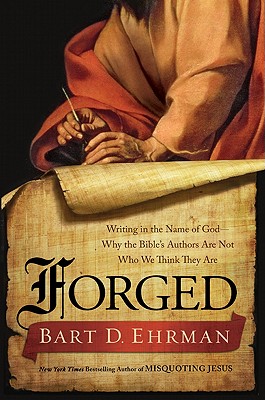“We may never know what drove these people . . .to hide their own identity and to claim, deceitfully, that they were someone else. Their readers, had they known, would probably have called them liars and condemned what they did. But in their own eyes, their conscience may have been free from blame, and their motives may have been as pure as the driven snow. They had a truth to convey, and they were happy to lie in order to proclaim it.”—from Forged
It is often said, even by critical scholars who should know better, that “writing in the name of another” was widely accepted in antiquity. But New York Times bestselling author Bart D. Ehrman dares to call it what it was: literary forgery, a practice that was as scandalous then as it is today. In Forged, Ehrman’s fresh and original research takes readers back to the ancient world, where forgeries were used as weapons by unknown authors to fend off attacks to their faith and establish their church. So, if many of the books in the Bible were not in fact written by Jesus’s inner circle—but by writers living decades later, with differing agendas in rival communities—what does that do to the authority of Scripture?
Ehrman investigates ancient sources to:
It is often said, even by critical scholars who should know better, that “writing in the name of another” was widely accepted in antiquity. But New York Times bestselling author Bart D. Ehrman dares to call it what it was: literary forgery, a practice that was as scandalous then as it is today. In Forged, Ehrman’s fresh and original research takes readers back to the ancient world, where forgeries were used as weapons by unknown authors to fend off attacks to their faith and establish their church. So, if many of the books in the Bible were not in fact written by Jesus’s inner circle—but by writers living decades later, with differing agendas in rival communities—what does that do to the authority of Scripture?
Ehrman investigates ancient sources to:
- Reveal which New Testament books were outright forgeries.
- Explain how widely forgery was practiced by early Christian writers—and how strongly it was condemned in the ancient world as fraudulent and illicit.
- Expose the deception in the history of the Christian religion.

No comments:
Post a Comment